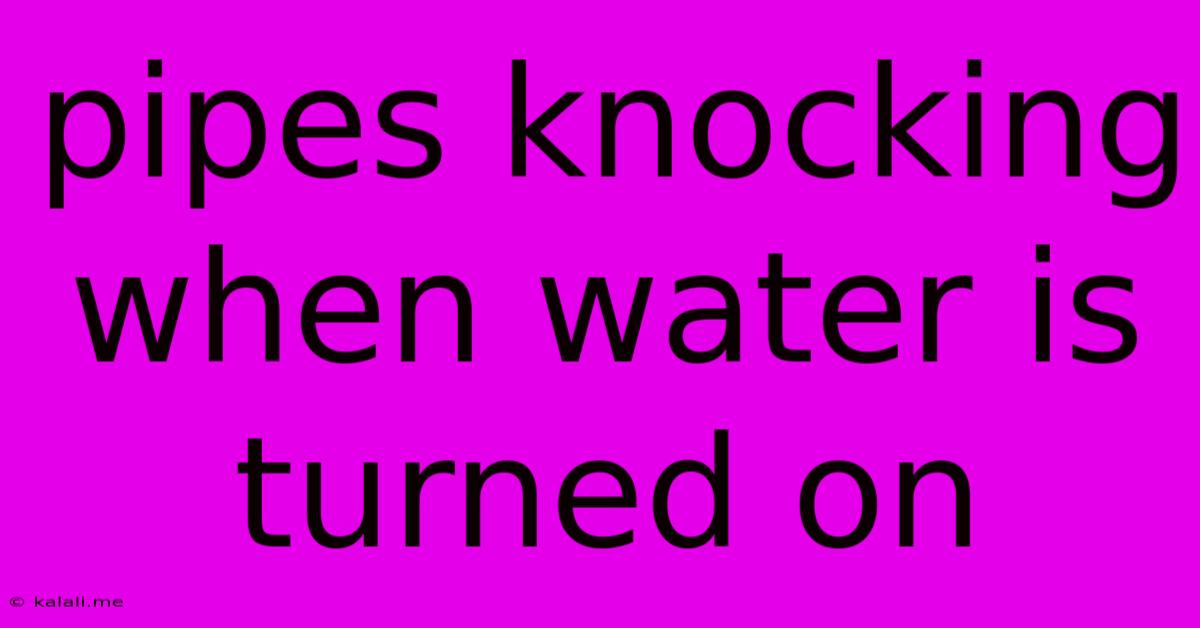Pipes Knocking When Water Is Turned On
Kalali
Jun 08, 2025 · 3 min read

Table of Contents
Pipes Knocking When Water is Turned On: Diagnosing and Fixing the Problem
Are you hearing unsettling knocking or hammering sounds from your pipes whenever you turn on the water? This annoying and potentially problematic issue, often referred to as water hammer, isn't just a nuisance; it can indicate underlying plumbing problems. This comprehensive guide will help you understand the causes, diagnose the severity, and explore effective solutions for those irritating pipe knocks.
What Causes Water Hammer?
Water hammer, that jarring banging noise, occurs when the rapid flow of water in your pipes suddenly stops. This abrupt halt causes a surge of pressure, creating a wave that travels through the pipes, causing them to knock against surrounding structures. Several factors can contribute to this phenomenon:
- Sudden Valve Closure: The most common culprit is a quickly closing valve, such as a faucet being turned off sharply. The momentum of the water continues, causing a pressure shock against the closed valve.
- Appliance Shut-Off: Dishwashers, washing machines, and toilets also use valves that can cause water hammer if they don't close gradually. Older appliances are more likely to be offenders.
- Water Pressure Issues: High water pressure in your system can exacerbate the effects of water hammer, making the knocking louder and more frequent.
- Loose Pipes: If your pipes aren't properly secured, the pressure surge from water hammer can cause them to rattle against framing, walls, or other objects, amplifying the noise.
- Air in the Pipes: Trapped air pockets within your plumbing system can contribute to the problem by creating a cushion that the water pressure impacts, leading to a knocking sound.
Diagnosing the Severity:
Before attempting any fixes, it's crucial to determine the extent of the problem. Is the knocking:
- Occasional and soft? This might indicate a minor issue that can be easily addressed.
- Frequent and loud? This suggests a more serious problem that requires attention.
- Localized to a specific area? This helps pinpoint the source of the water hammer.
- Accompanied by other symptoms? Leaks, low water pressure, or discolored water might indicate more significant plumbing problems.
Solutions for Eliminating Water Hammer:
Addressing water hammer requires a multi-pronged approach, starting with the simplest solutions:
1. Slow Down the Valve Closure: The easiest fix is simply to turn off faucets and appliances more slowly. This allows the water pressure to decrease gradually, minimizing the pressure surge.
2. Install Water Hammer Arrestors: These inexpensive devices are specifically designed to absorb the shock waves caused by sudden water flow changes. They are typically installed near faucets, appliances, and other water-using fixtures. They're usually small and easy to install, and a plumber isn't necessarily required.
3. Check and Secure Pipes: Inspect your plumbing system for any loose pipes. Secure loose pipes by tightening brackets and straps. This will prevent them from rattling against other components.
4. Address High Water Pressure: If you suspect high water pressure, consider installing a pressure regulator. This device will maintain a consistent water pressure throughout your system, reducing the impact of water hammer.
5. Bleed Air from the Pipes: If air is trapped in your pipes, you may be able to bleed it out by opening faucets at various points in the system. Sometimes a gentle bump on the pipes might dislodge small air pockets. This however, is generally a temporary fix.
6. Call a Plumber: If the problem persists or you're unsure how to proceed, it's always best to consult a qualified plumber. They can accurately diagnose the cause of the water hammer and implement a permanent solution.
Preventing Future Water Hammer:
- Choose quality plumbing fixtures: Select faucets and appliances with slow-closing valves to minimize the chance of water hammer.
- Regularly inspect your plumbing system: Check for loose pipes and other potential problems that could contribute to water hammer.
- Maintain proper water pressure: Ensure your water pressure is within the recommended range to avoid pressure surges.
By understanding the causes of water hammer and employing these preventative and corrective measures, you can eliminate the annoying knocking sounds and ensure the longevity of your plumbing system. Remember, a little preventative maintenance can go a long way!
Latest Posts
Latest Posts
-
In The End We Will Remember
Jun 08, 2025
-
How To Put In A 240v Outlet
Jun 08, 2025
-
How To Change Led Ceiling Light
Jun 08, 2025
-
Probability Of 4 Numbers From 0 To 9
Jun 08, 2025
-
Amplitude Modulation With Two Notes Of Different Pitches
Jun 08, 2025
Related Post
Thank you for visiting our website which covers about Pipes Knocking When Water Is Turned On . We hope the information provided has been useful to you. Feel free to contact us if you have any questions or need further assistance. See you next time and don't miss to bookmark.